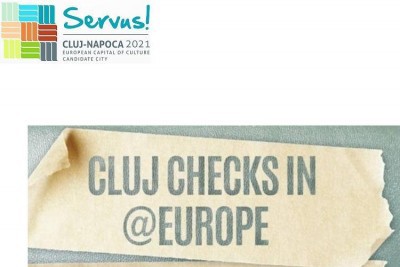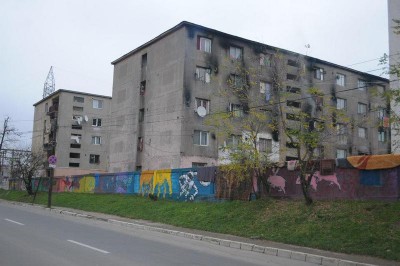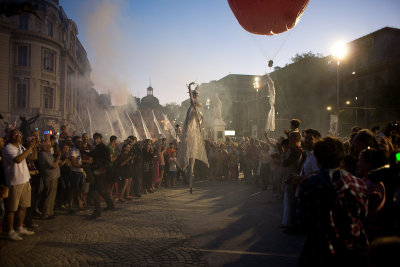January 21, 2016
By Andreea Grecu
European Cultural Capitals – are local authorities for or against culture?
The uproar caused by recent events in Cluj-Napoca, where elements of monumental sculpture were destroyed by local authorities for reasons of public safety (sic!) reignite a long-running debate over the impact that European Capitals of Culture have on the evolution of cities that receive this title.
Servus logo created for the candidature of Cluj Napoca; Cluj checks in is a support project for the candidature. Source: www.clujnapoca2021.ro
Numerous articles have been written about this initiative and about the individual campaigns that Romania’s 14 candidate cities have run in order to support their applications. Perhaps the most sensitive touched-upon issue arose with respect to the long-term effects of sudden attention given to culture by local authorities.
We should now embark upon a shortlist of the four cities remaining in the competition. Of these, Baia Mare, Bucharest and Cluj-Napoca still have much work to do (with Cluj having made a significant step backwards during the first week of 2016) to show us that they outgrew December’s festive moment, when the Ministry of Culture announced the International Selection Jury’s conclusions.
Actually, the problems with local cultural politics are complicated for every city in Romania, but during this time, the spotlight falls on those that engaged in a long term application.
Firstly, talking about what I know best, I will start with Bucharest. Over the course of six months, I was part of the team that developed and subsequently drafted Bucharest’s Cultural and Creative Strategy – a project that has been subject to public debate since February 2015.
Secondly, I recall with sadness how, in the spring of 2015, a senior official in the Cultural Affairs Department of the capital’s General City Hall asked: “How is it possible that a cultural strategy is up for public debate? Why am I not familiar with the contents of the documentation?” Nearly a year after being published, Bucharest’s Cultural and Creative Strategy for the years 2015-2015 has not yet been incorporated into the work of the General City Hall, i.e. the local authority.
The Strategy was voted down (for the time being) by local councilors, who have thus refrained from offering the city a first strategic document for the cultural scene. Voting it though would have inherently involved the granting of funds, as well as the establishment of an annual action plan based on the resources provided, i.e. the shift from planning to practice, without which many strategic documents (see the 2014-2020 Sector Strategy for Culture) remain mere attempts at changing the operating mode in cultural life.
Instead, Bucharest was shortlisted among the cities remaining in the competition to organize the European Capital of Culture for the year 2021, in spite of – we might say – not committing to a Strategy that would actually allow the timely preparation, in good conditions, of an entire year of cultural and creative events referred to as the European Capital of Culture.
Going back to the title of this article, we have four candidates. How should we go about it?
The challenge of organizing a European Capital of Culture requires thoughtful balance between resources that will undoubtedly be raised – as was the case for Sibiu – and the effort undertaken by local authorities, to be materialized in approved budgets, long-term designated officials, and specialists co-opted to preparation & organization teams.
If we are to summarize the essence of the problem, we are dealing with a way of working that the city will either sustain or fail to sustain for a period of 6 years. Then, what matters is the continuity of this way of working. After 2021, regardless of who will host the European Capital of Culture, the local cultural community will certainly not accept a return to the years 2014-2015 and to poor communication with the local authority.
Therefore, in the case of Bucharest, a dichotomy lies between that which is achieved by the ArCuB Center for Cultural Projects, as tertiary authorizing officer appointed for the preparation and support of Bucharest’s candidature through the “YOU ARE BUCHAREST” (EȘTI BUCUREȘTI) and “Invisible City” (Orașul invizibil) programs, and that which the City Hall takes upon itself as bearer of the final budgetary responsibility and as chief authorizing officer, respectively. Furthermore, the quasi-total identity of the subordinated institution’s image with the image of the authority under which it operates has been demonstrated during focus groups held in the fall of 2014, when participants tended to equate the approach to which they contributed with other responsibilities that the City Hall has towards the cultural scene.
Just like a Damocles’ sword menacingly dangling over our heads, erasing every good thing that was brought about by the process of preparing the application for the European Cultural Capital (constant communication, openness, transparency, working with foreign experts that were invited by the spokesperson in the organizing team) is a possible end to this route, seen from the perspective of public politics. However, it is more likely that after announcing the winning city for the European Cultural Capital 2021 (at least I hope so!), any city hall belonging to any town that wanted to win this title and applied for it will closely analyze their decisions regarding the cultural and creative life.
I am emphasizing the word hope, because I still feel affected by the news that replayed the footage with firefighters knocked down pieces of the monumental sculptures belonging to type A and B buildings in Cluj Napoca. And I’d have so many nice things to say about the people of Cluj! But more about them in the next article.
POSTED BY
Andreea Grecu
Andreea Grecu is a cultural manager and lecturer. Between 1999-2004, then from 2009 onward, she is active on the NGO scene, as member of cultural associations and professional unions in domanis such a...








